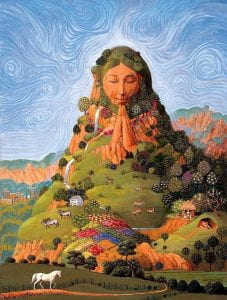Women in the Global South are impacted by environmental degradation byways of employment, harvesting food, providing steady income, clean water, and women themselves are put at an even greater risk. “90% of Asia’s rice is cultivated by women and 70% of subsistence crops in Ghana are produced by women”(Klusener 2019). Because of severe droughts, habitat destruction, monocropping, women are put at more risk of loss of employment in agriculture. These impacts not only prevent them from being able to provide for their families, but these environmental impacts can have drastic measures on the food supply for regions as well. This applies to the pollution of water as well, in many Global Southern countries it is the woman’s job to provide the household with clean usable water, to perform everyday activities, like bathing, cooking, hygiene, and drinking. Not only does environmental impact put a strain on the abundance of water, but sources are often controlled by private owners and companies. These owners are in control of many of the water supplies in these Southern countries, raising the price far to the height at which families can pay. This driving up of the water prices can be some of the highest percentages of people’s cost of living. The wells that supply the water are often spread far apart, away from villages, sometimes several miles, putting even more strain on women. Mothers, daughters, even pregnant women walking miles to a well for a resource that some consider a natural right. As water becomes more scarce girls often have to drop out of school just to help provide their families with the resources they need, hurting not only the women but the culture as a whole by taking away education.
I think both authors draw on the aspects that one, women play a major, often underappreciated role in every society. Despite being the main caregiver, manager of the household, birther, often raiser as well, women are often looked down upon or overlooked in many societies. Though in Warren and Hobgood-Oster’s reading you get a sense of the connection between humans (men) and degradation of nature, and man’s degradation and oppression of women as well. Western ecofeminism seems to see women and nature as being more connected to men and nature, focusing primarily on destructive ways in which society is built and operates. While Western feminism and ecofeminism may be more centric in the ideal held in western countries and beliefs, the western movement holds the idea of free speech and action very high. They use this to group many different categories of women together. The movement forgoes political and social issues for the opportunity to overcome patriarchal society converting it into a more diverse equal society. The other perspective difference may be from where the movement generates much of their power and ideas. In non-western ecofeminism, it if often poorer, rural women, who are drastically impacted by drastic changes in the environment. These women attempt to make the change not only their community but their country as well. But their perspective is different from the western view, which is often shaped by more highly educated, less at-risk individuals, some of which focus primarily on women’s rights and activation as a career.
Of these two perspectives, I personally see value in both. The task of equality, whether it is on the environmental front, or women’s suffrage front is a global issue that cannot be solved and implemented by one solely one group. It is up to academics to help keep the wheels of legislation, learning, and growth turning, helping forge the idea of a more balanced society. But it is also up to those living at the forefront of the at-risk third world, the changes and stands that these women make are on the world stage, their resilience inspires courage and shows that changes can and will be made. Each perspective aid the other in forming a better tomorrow and becoming remodels for those to become the driving force of the future.
Klusener, Edgar, et al. “Are Women in the Global South ‘Victims’ or ‘Saviours’ in the Face of Environmental Challenges?” Global Social Challenges, 2 Oct. 2019, sites.manchester.ac.uk/global-social-challenges/2018/04/19/923/.

